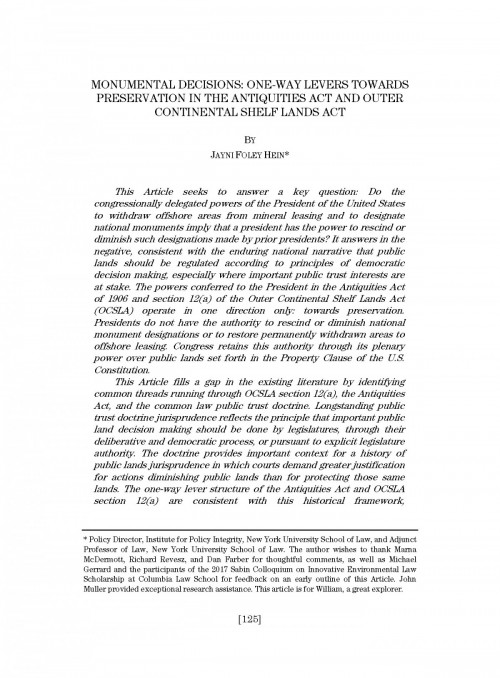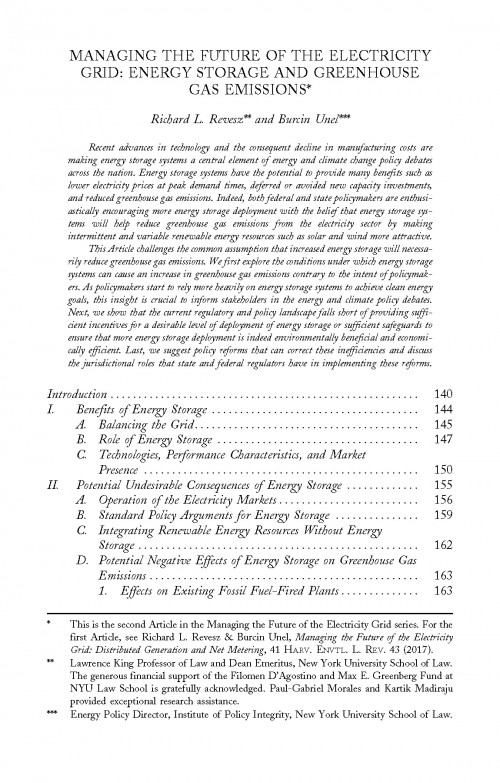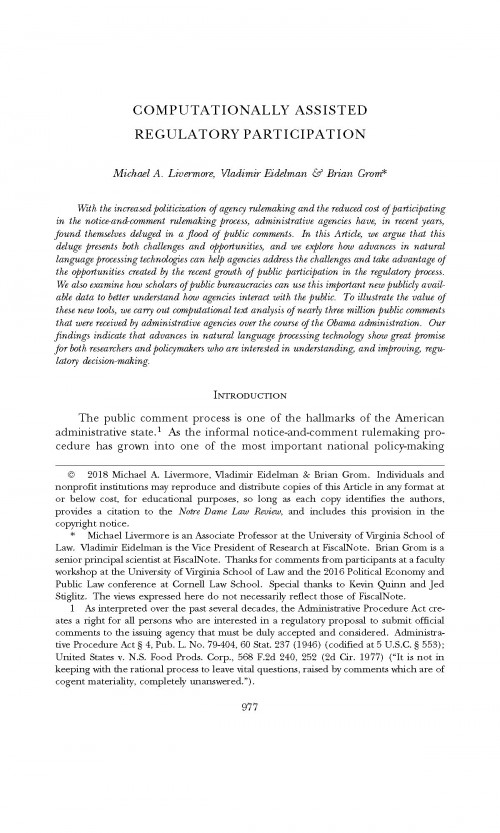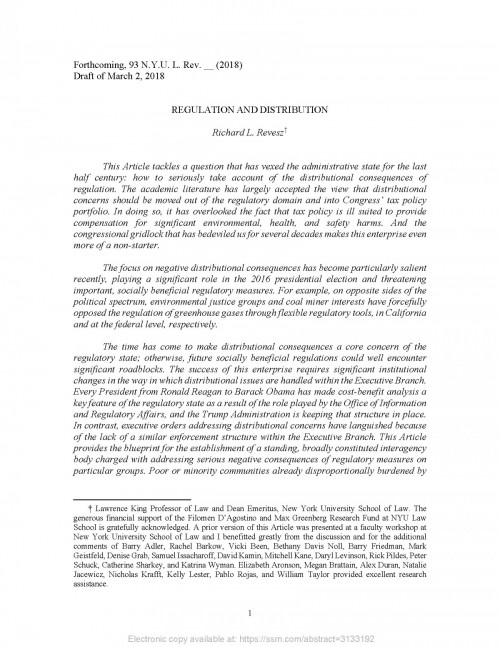-

Monumental Decisions: One-Way Levers towards Preservation in the Antiquities Act and Outer Continental Shelf Lands Act
Published in Environmental Law Review
In new legal scholarship published in Environmental Law Review, Jayni Hein argues that the powers granted to the President in the Antiquities Act and Outer Continental Shelf Lands Act (OCSLA) operate in one direction only: towards preservation. Presidents do not have the authority to rescind or diminish national monument designations, nor to re-open previously withdrawn areas to offshore leasing. Congress, alone, retains this authority over public lands.
-

Managing the Future of the Electricity Grid: Energy Storage and Greenhouse Gas Emissions
Recent advances in technology and the consequent decline in manufacturing costs are making energy storage systems a central element of energy and climate change policy debates across the nation. Energy storage systems have the potential to provide many benefits such as lower electricity prices at peak demand times, deferred or avoided new capacity investments, and reduced greenhouse gas emissions. Indeed, both federal and state policymakers are enthusiastically encouraging more energy storage deployment with the belief that energy storage systems will help reduce greenhouse gas emissions from the electricity sector by making intermittent and variable renewable energy resources such as solar and wind more attractive. This article, published in the Harvard Environmental Law Review, challenges this common assumption that increased energy storage will necessarily reduce greenhouse gas emissions.
The article was selected by Environmental Law Reporter as one of the five best environmental law articles published during the 2018-2019 academic year. An adapted version, The Future of Energy Storage: Adopting Policies for a Cleaner Grid, was included in the August 2019 Environmental Law and Policy Annual Review issue of Environmental Law Reporter’s News & Analysis.
-
Comments to California on Its Cap and Trade Program
California has legislation authorizing its Air Resources Board (ARB) to extend its cap-and-trade program for carbon emissions. This extension, while defining much of the program’s structure, asks ARB to develop some design features through a regulatory process and public feedback. California’s most recent changes to the plan are consistent with our previous comments on the program, and they place California on the path to internalizing the cost of climate change from carbon emissions. Our most recent set of comments encourage ARB to continue to set the price ceiling for carbon permits at least as high as the Social Cost of Carbon set by the Interagency Working Group in 2016, as it does in its Concept Paper on carbon pricing. We also encourage ARB to allocate preferentially any unsold carbon allowances to the price ceiling, rather than to a lower price.
-
Comments on California PUC Order Instituting Rulemaking to Create a Consistent Regulatory Framework for the Guidance, Planning, and Evaluation of Integrated DERs
California has long been a trendsetter in clean energy policy, and our input helped inform the state’s approach for evaluating distributed energy resources (DERs), such as rooftop solar installations. The state’s new approach, which will quantify the environmental benefits of DERs, could help influence other policies around the country, boosting the growth of clean energy sources. Our comments to the California Public Utilities Commission were heavily cited in a March 2018 administrative law judge ruling, which, if adopted by the Commission, would require utilities to conduct a societal cost test to determine the cost-effectiveness of DERs.
-
Brief Challenging Suspension of NHTSA Rule on Fuel Economy Penalties
In 2017, the National Highway Traffic Safety Administration (NHTSA) suspended its 2016 Civil Penalties Rule, which adjusted the penalties for automobile manufacturer non-compliance with fuel economy standards for the first time in decades to reflect inflation. In issuing its suspension, NHTSA claimed that it was causing no harm. Our brief in the case challenging this suspension shows that NHTSA’s claim of no harm was inaccurate.
-

Computationally Assisted Regulatory Participation
With the increased politicization of agency rulemaking and the reduced cost of participating in the notice-and-comment rulemaking process, administrative agencies have, in recent years, found themselves deluged in a flood of public comments. In this article, published in the Notre Dame Law Review, the authors argue that this deluge presents both challenges and opportunities, and they explore how advances in natural language processing technologies can help agencies address the challenges and take advantage of the opportunities created by the recent growth of public participation in the regulatory process.
-
Comments on Use of the Social Cost of Greenhouse Gases in Environmental Impact Statements
We recently submitted joint comments to advocate for the proper use of the social cost of greenhouse gases in multiple environmental impact statements. Our comments to the Office of Surface Mining and Reclamation (OSMRE) and our comments to the Bureau of Land Management (BLM) focused on the agencies’ failure to use the social cost of greenhouse gases metric to account for the climate effects of anticipated project emissions. In our comments on the Bureau of Ocean Energy Management (BOEM)’s 5-year scoping plan for offshore oil and gas leasing, we emphasized that if and when BOEM decides to monetize greenhouse gas emissions, it should use the 2016 IWG estimates, as it has done in the past.
-
Comments on Interior’s Offshore Oil and Gas Leasing 2019-2024 Draft Proposed Program
The Department of the Interior’s offshore leasing program must analyze and account for the potential for environmental damage, the potential for the discovery of oil and gas, and the potential for adverse impact on the coastal zone. In addition, offshore oil and gas leases must provide fair market value for private use and development of these publicly-owned oil and gas resources. Our comments to the Interior’s Bureau of Ocean Energy Management (BOEM) explain why its Draft Proposed Program for 2019-2024, which would replace BOEM’s existing Program for 2017-2022, fails to meet its statutory mandates under the Outer Continental Shelf Lands Act (OCSLA).
-

Regulation and Distribution
Most regulations seek to improve social welfare, but maximizing overall welfare may not help or protect all groups evenly. Many economists suggest handling unequal regulatory effects through the tax system. But some harms—like the disproportionately high environmental pollution felt by poor and minority communities and loss of the employment base in rural communities due to shifts in the economy—cannot be addressed by monetary compensation alone. A new article by Richard Revesz, published in the NYU Law Review, offers a blueprint for establishing a standing, broadly constituted interagency body charged with addressing serious negative consequences of regulatory measures on particular groups.
-
Mineral Royalties: Historical Uses and Justifications
Published in the Duke Environmental Law & Policy Forum
Governments and private landowners have collected royalties on mineral resources for centuries. When comprehensive measures to account for the environmental externalities of mineral extraction are politically or practically unavailable, federal and state governments may consider adjusting royalty rates as an expedient way to account for these externalities and benefit society. One key policy question that has not received attention, however, is whether a royalty rate can and should be manipulated in this way, assuming statutory discretion to do so.
This article, published in the Duke Environmental Law & Policy Forum, fills that gap by evaluating the argument for increasing federal or state fossil fuel royalty rates through historical, theoretical, and practical lenses. To that end, this article in turn considers the meaning of royalties, the economic justifications for royalties, the legislative history of the implementation of federal royalties, and the considerations that private landowners have relied upon in setting royalties. This article concludes that it would be appropriate for governments to adjust mineral royalty rates to account for negative externalities not otherwise addressed by regulation or to otherwise promote public welfare. Such use of royalties is consistent with the historical record. Royalties have been used as pragmatic policy tools from almost their inception, and federal and state governments have often exercised their existing statutory discretion to adjust mineral royalty rates to promote public welfare.





